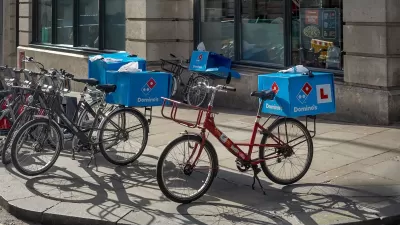London has been preparing for years for a “quiet revolution” for its bike network: the "Quietways" of side streets and back roads. London is already building Quietways in anticipation of a September launch.
London is approaching a September launch date for an innovative approach to bike infrastructure: "Quietways," or bike routes that exist off of main roads on back streets rarely visited by heavy vehicle traffic. "It may sound like a cop-out, but there’s some intelligent thinking to the scheme that makes it more than a ruse to tidy cyclists away under the carpet,” writes Feargus O’Sullivan. “For a start, London’s unique street design suits the idea brilliantly, which is why many London cyclists have used their own, unofficial versions of the networks for years. In the city’s core, streets are often too narrow to allow smooth flowing car traffic anyway, while London’s early love affair with streetcar suburbia means that it has nearly endless leafy streets for cyclists to weave through."
O’Sullivan notes with some trepidation that London’s recent proposals for bike improvements will also cede streets over even further to cars. "The lanes’ creators are also thinking about how bikes will interact with other traffic. To lessen the jarring screech and surge typical of city cars hitting intersection after intersection, traffic lights will be reduced in favor of raised, speed table pedestrian crossings (possibly with Belisha Beacons), which are thought to be better at slowing cars while keeping streets free flowing."
FULL STORY: London's Plan to Move Cyclists to Side Streets

Maui's Vacation Rental Debate Turns Ugly
Verbal attacks, misinformation campaigns and fistfights plague a high-stakes debate to convert thousands of vacation rentals into long-term housing.

Planetizen Federal Action Tracker
A weekly monitor of how Trump’s orders and actions are impacting planners and planning in America.

Chicago’s Ghost Rails
Just beneath the surface of the modern city lie the remnants of its expansive early 20th-century streetcar system.

Bend, Oregon Zoning Reforms Prioritize Small-Scale Housing
The city altered its zoning code to allow multi-family housing and eliminated parking mandates citywide.

Amtrak Cutting Jobs, Funding to High-Speed Rail
The agency plans to cut 10 percent of its workforce and has confirmed it will not fund new high-speed rail projects.

LA Denies Basic Services to Unhoused Residents
The city has repeatedly failed to respond to requests for trash pickup at encampment sites, and eliminated a program that provided mobile showers and toilets.
Urban Design for Planners 1: Software Tools
This six-course series explores essential urban design concepts using open source software and equips planners with the tools they need to participate fully in the urban design process.
Planning for Universal Design
Learn the tools for implementing Universal Design in planning regulations.
planning NEXT
Appalachian Highlands Housing Partners
Mpact (founded as Rail~Volution)
City of Camden Redevelopment Agency
City of Astoria
City of Portland
City of Laramie





























